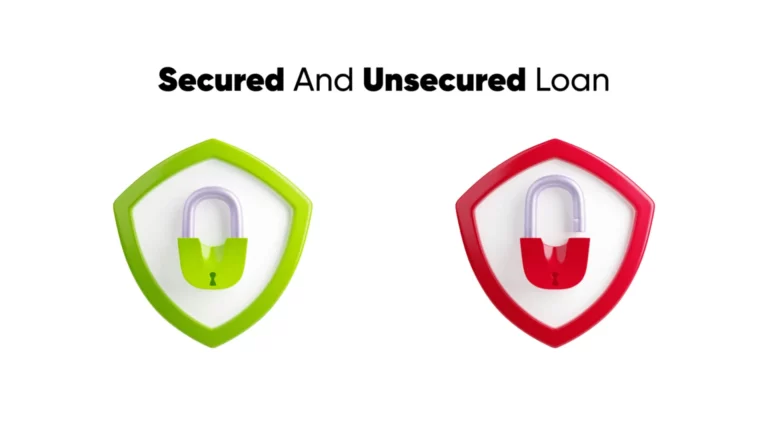Facing an emergency but have no savings left? An emergency loan is there for your rescue.
Want money for your higher education? An education loan can fund your dream course.
Dreaming about that solo trip? Take a travel loan to make it happen.
These different kinds of loans, which are so easily available in the market, are helping millions of Indians meet their diverse needs, every day. But while they serve different purposes, they’re divided into 2 types based on the terms of borrowing – secured loan and unsecured loan.
Here’s everything you need to know about the difference between secured loan and unsecured loan:
Table of Contents
ToggleWhat is a Secured Loan?
A secured loan is when you have to pledge an asset (like your jewelry, land, vehicle, etc.) as security against the money you borrow. For example, if you’re taking a home loan, then the property or house you buy using the loan is the collateral you provide. Usually, secured loans have a lower interest rate and longer repayment tenure because they’re collateral-backed loans.
What is an Unsecured Loan?
An unsecured loan is when you don’t have to provide any collateral against the loan you take. Unsecured loans are also known as personal loans. You can use this money anywhere you like without any restrictions. The majority of personal loans taken for purposes like travelling, shopping, etc. are unsecured loans.
Secured loan vs unsecured loan: Features & Characteristics
Understanding the features of a secured loan and an unsecured loan can help you understand the difference better based on which you can make a more informed decision.
1) Collateral
A collateral is an asset (like your jewelry, land, vehicle, etc.) that you provide to your lender as security in exchange for a loan.
In a secured loan, you have to pledge collateral against the money you borrow and use it only for the purpose of borrowing.
Unsecured loans are collateral-free loans. You don’t have to provide any of your assets as security and can use the money anywhere you like, without any restrictions.
2) Interest Rate
Secured loans are comparatively less risky for a lender. This is why the interest rate offered for a secured loan is lower than an unsecured loan. However, if you have a good credit score, a clean repayment history and a strong credit profile, you can get the lowest interest on unsecured loans.
3) Repayment Tenure
The repayment period of secured loans is longer than unsecured loans. If you take an unsecured loan, you can repay the money in 3 months to 60 months, depending on your lender. But the loan tenure of a secured loan especially a home loan can go up to even 30 years.
4) Processing Time
Secured loans have a longer application process and more document requirements. Because of this it takes longer to process a secured loan compared to an unsecured loan.
With Zype, you can get approved for an unsecured loan up to ₹5 lakhs in no time! Complete the application in 6 minutes, get approved in 60 seconds and receive the money in your account instantly.
5) Consequences of Defaulting
If you don’t repay your unsecured loan on time, you might face consequences like late fees, a negative impact on your credit score and reduced loan eligibility. But if you default on your secured loans, apart from the other consequences, the lender has the right to seize your collateral.
Also Read: Consequences of Missing Your EMIs
Secured Loans Vs Unsecured Loans: Which one to Choose
Before choosing between a secured loan and an unsecured loan, you should evaluate your financial requirements because both these loans serve very different purposes.
If you want to borrow money for a specific purpose like buying a property or a new car, then a secured loan will be a better option for you. You can get a lower interest rate and a longer repayment tenure on secured loans.
If you need the money instantly, don’t want to provide any collateral, and don’t want any restrictions on the end use of the loan, then choose an unsecured loan. If you have a strong credit profile, you can get the lowest interest rates on your loan.
Zype offers super-fast unsecured loans up to ₹5 lakhs. Complete an easy application without any required document uploads and get approved for a loan in 60 seconds.
Is a Secured Loan Better than an Unsecured Loan?
If you have a particular purpose for borrowing money like buying a property or a new car, then a secured loan is better than an unsecured loan.
You can get the loan amount you need at a lower interest rate. The repayment tenure on secured loans is comparatively longer, so you can repay the personal loan in flexible EMIs.
Make sure you repay your EMIs on time because if you default on your loans, the lender has the right to seize the collateral you provided as security.
Secured Loan vs Unsecured Loan: Interest Rates
Unsecured loans are collateral-free loans. Because of this, the interest rate offered on unsecured loans is higher as compared to secured loans.
Usually, the interest rate on a secured loan can range between 8.75% to 18%. But the interest rate offered can vary depending on the type of secured loan you’re taking. For example, if you’re taking a home loan, then the interest rate is between 8.75% to 15% but if you’re taking a two-wheeler loan, then it could be between 8.75% to 18.75%.
In India, the interest rate offered on unsecured loans can range between 8.75% to 49.5% per annum, depending on your loan providers. Want an affordable personal loan at a low-interest rate? Get an instant personal loan up to ₹2 lakhs from Zype starting at just 1.5% per month!
Conclusion:
While both secured and unsecured loans can help you meet your immediate need for money, they have very different features and are best suited for different purposes.
But now that you know the key difference between secured loan and unsecured loan, you can evaluate your financial situation and requirements to make a more informed decision.
Must Read: How to Get a 50000 Loan on an Aadhar Card?
Frequently Asked Question
What are the Advantages & Disadvantages of Secured Loans?
Advantages
- Lower interest rates on the loan
- Longer repayment tenure
- Higher loan amount
Disadvantages
- You have to provide an asset against the personal loan.
- The lender can seize the collateral if you default on your loan.
- Higher processing time
What are the Benefits of Unsecured Loans?
These are the benefits of unsecured loans:
- You don’t have to provide any collateral as security to borrow the money.
- You can use the money anywhere you like without any restrictions.
- It takes less time to process an unsecured loan.
What are Some Examples of Secured Loans?
Car loans, two-wheeler loans, home loans, gold loans, etc. are all examples of secured loans.
Do Unsecured Loans Require Collateral?
No, you don’t have to provide any collateral as security to take an unsecured loan.
Which Type of Loan Typically has a Lower Interest Rate, Secured or Unsecured?
While secured loans have a lower interest rate as compared to unsecured loans, with a good credit score, clean repayment history and a strong credit profile, you can enjoy lower interest rates on unsecured loans as well.
What is Collateral, And Why is it Important in Secured Loans?
Collateral is an asset (like your jewelry, land, vehicle, etc.) that you provide to your lender as security in exchange for a loan.
A collateral is important in secured loans because it acts like a guarantee against the loan taken by the borrower.
Are Unsecured Loans Risk-Free for Borrowers?
Unlike a secured loan, in an unsecured loan the pledged assets are not at risk of being seized by the lender. This makes it a less risky loan for the borrower.








